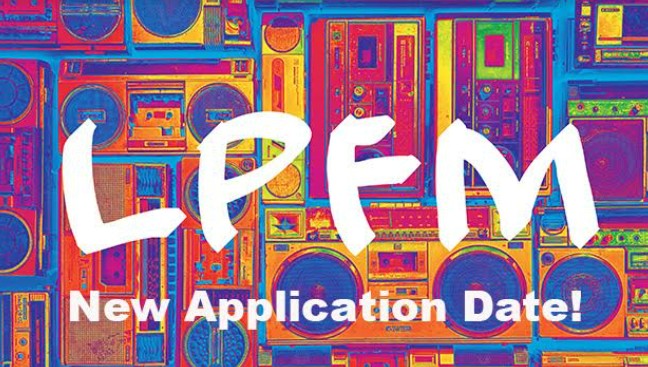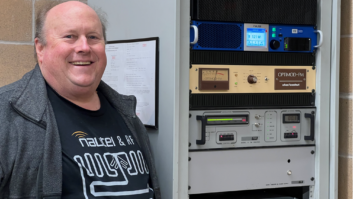Radio World has introduced a series of articles titled “Firing Up Frequencies,” intended for readers who may be interested in applying for a low-power FM station license during the FCC’s upcoming window in December 2023 — recently extended by five weeks. The following story is the fourth installment in the series.
The author is Sharon Scott, president and co-founder of ART FM, WXOX in Louisville, Ky. Sharon is the author of the new book “Low-Power FM for Dummies.”

Once in a blue moon the world surprises you, its people inspire you and something truly miraculous happens. Those who are keeping up with the new Low Power FM opportunity may know what I mean. On Tuesday, the Federal Communications Commission pushed the LPFM application window back five weeks to Dec. 6 – 13, 2023. The extension comes as a huge relief to those assembling new station filings, and as fresh inspiration to those who are working to identify nonprofit applicants nationwide!
This action is a direct response to the “Request for Delay of Low Power FM Filing” penned by Todd Urick of Common Frequency, assisted by Michael Brown of Brown Broadcast Services and submitted to the FCC by Attorney Alan Korn on Oct. 12, 2023. The letter to the commission was signed by an impressive list of nonprofit and tribal media organizations including the Pacifica Affiliates, Native Public Media, REC Networks and the National Federation of Community Broadcasters.
The eloquent letter starts by thanking the commissioners for the LPFM opportunity and assuring them that the interest in building low-power stations has been increasing in recent weeks. This is good news but, as a result, the primary LPFM assistance providers have reached an “untenable workload.”
Much of this has to do with the fact that most prospective LPFM applicants are nonprofit organizations with no previous broadcast knowledge. Teaching them about the process and helping them make educated decisions about the opportunity takes more time and energy than dealing with broadcast professionals.
The point is made that, while many nonprofits would like to apply for FM frequencies, there is little chance that they will hear about the opportunity. Community radio advocates have been doing their best to inform the public but, with limited resources, they don’t have the capacity to reach a fraction of the 1.5 million nonprofits across the United States.
In addition to delaying the window, the letter invites the FCC to use its clout to inform the public about the Low Power FM application process. “More nonprofits should have a fair chance at knowing and taking advantage of this opportunity.”
In seeking an extension, the authors remind the FCC of the “inflexible approval process innate to educational institutions and nonprofits.” They make the point that such organizations “do not have agile decision-making apparatuses” to make big choices for their groups quickly.
Many nonprofit boards only meet monthly and most educational institutions are adjourned during the summer. All-in-all, American nonprofits have had very little time to consider the LPFM application opportunity that was announced at the end of June 2023.
The letter goes on to make a few other important points and ends by saying, “the quality of LPFM applicants would be better if the window were delayed/extended … If LPFM applicants had a filing window delay, we could assist many more applicants in current need, which would, eventually, considerably increase broadcast localism nationwide.”
The FCC must have found the arguments compelling because, just a few days later, on Oct. 17, 2023 they issued a public statement in direct response to this request.
The commissioners announced that they would, in fact, delay the Low Power FM window for an additional five weeks. “Although it is the Commission’s general policy that extensions of time shall not be routinely granted,” the statement read, “we find that it would serve the public interest to delay the LPFM filing window by several weeks to afford interested parties sufficient time to prepare applications for new construction permits for this important service.”
The LPFM community responded to the news with a lot of excitement and a bit of surprise. New applicants immediately began expressing gratitude for the extra preparation time with comments online, while community radio advocates were busy behind the scenes reassessing outreach strategy. However, even with the delayed window, time is still running out quickly on what may be the last nationwide opportunity for local organizations to claim their spot on the FM dial.
With five additional weeks to get the word out across the country, those who understand the importance of community radio must make this their main priority.
The FCC charges no fees for applying for or holding an LPFM license. However, in many cases, organizations will need to hire a professional to conduct an engineering study. Applications can —and will — be dismissed for small technical errors. As such, nonprofits are encouraged to work with a professional on their LPFM submission whether or not an engineering study is required.
Now that there is more time, there are more LPFM engineering options. The nonprofit group Common Frequency is offering free and reduced application preparation rates to nonprofit arts and cultural organizations. Brown Broadcast Services, International Media Action and the Prometheus Radio Project are taking on new applicants. Also, REC Networks is once again accepting new LPFM clients with the sole stipulation that they are nonprofit organizations with good standing in their state.
Luckily, there is still time to form a nonprofit organization if you do not have one already. The second article in this series, Taking it LPFM: Finding or Founding Your Nonprofit will walk you through the steps.
The delay of the LPFM application arrives just as the sand was running out. The hourglass has been flipped over and we are getting a second chance. It is up to us to use it well and not waste a single minute. Media advocacy organizations must ACTIVATE NOW. They should use their social media outlets and email networks to let their constituents know about the LPFM window and understand its importance.
Individual advocates should be reaching out to nonprofit organizations, educational institutions and tribal leaders to inform them of the opportunity. Those listening to online stations should contact the managers and encourage them to take the leap!
It is so important to get these remaining FM frequencies in the hands of the American people while we have this rare opportunity. Remember, organizations will have three years to build and finance the operation once they are granted a Construction Permit from the FCC. If it doesn’t work out, or they change their mind, they can transfer the permit to another qualifying nonprofit and even recoup some of their expenses.
Those interested in starting a Low Power FM station should refer to the first article in this series that lays out all the basic steps, Get Ready to Fire Up the Frequencies. The LPFM resources website is another easy place for curious parties to dive right in!
Pass it on, share the word. It truly is not so difficult to apply for a Low Power FM license – especially now that our community radio heroes have bought us this additional time. LPFM has just leveled up! Seize the dial, master the game!











